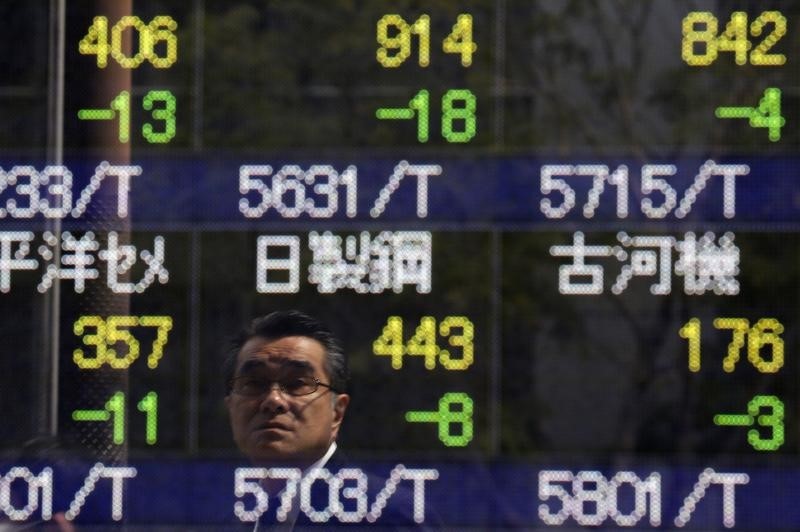Nvidia and TSMC to unveil first domestic wafer for Blackwell chips, Axios reports
* MSCI ex-Japan eases from 4-1/2 month high hit on Tues
* Oil prices slip on oversupply fears
* Gold near 8-1/2 year high on safe haven demand
* Citi 'overweight' on U.S. and EM equities
By Swati Pandey and John McCrank
SYDNEY/NEW YORK, July 8 (Reuters) - Asian stocks dithered on
Wednesday as an increase in new coronavirus cases in some parts
of the world cast doubts over the economic recovery while oil
prices eased on oversupply fears.
MSCI's broadest index of Asia-Pacific shares outside Japan
.MIAPJ0000PUS were a tad lower after hitting a 4-1/2 month
high just on Tuesday.
Chinese shares flickered between green and red. Australian
shares .AXJO were down 0.4% as were indexes for New Zealand
.NZ50 and South Korea .KS11 . Japan's Nikkei .N225 was off
0.1% and Hong Kong's Hang Seng index .HSI was slightly firmer.
E-mini futures for the S&P 500 EScv1 added 0.18%.
Overnight, U.S. stocks fell, halting a five-day winning
streak by the benchmark S&P 500 index, its longest this year and
driven by better-than-expected economic data. Following the recent rally, the declines looked like a
consolidation, with the markets largely in "wait and see mode"
ahead of the upcoming earnings session, said NAB economist Tapas
Strickland.
Second-quarter earnings season will begin in earnest from
next week.
"It will be important to watch the number of U.S. deaths in
coming weeks and whether greater questions will be asked about
the extent of necessary restrictions," Strickland added.
California reported more than 10,000 coronavirus cases on
Tuesday, a record rise for a single day that also surpassed the
number of contact tracers recently trained by the state to
detect and prevent potential outbreaks. Coronavirus cases were also on the rise in the Australian
state of Victoria, which led to lockdown measures being
reimposed in Melbourne, the country's second-biggest city.
"The second wave of infection will see Victorian economic
activity fall sharply and it will continue to lag the rest of
Australia," said NAB economist Kaixin Owyong.
Victoria makes up around a quarter of Australian economic
activity, she said.
Citi analysts predicted global equities would hang around
current levels in twelve months' time.
"We expect bullish and bearish forces to cancel each-other
out," they said in a note. "We would not chase markets higher
from current levels, but would prefer to wait for the next dip."
Citi has "overweight" positions on U.S. and Emerging Markets
equities.
Most major currencies were trapped in a range.
The U.S. dollar was 0.15% higher on the Japanese yen at
107.65. JPY=
The risk sensitive Australian and New Zealand dollars
AUD=D3 NZD=D3 were a shade weaker at $0.6940 and $0.6544,
respectively.
The euro EUR=D3 was barely changed at $1.1273.
In commodities, gold hovered near a recent 8-1/2 year peak
as investors preferred safe-haven assets. Spot gold XAU= was
last a shade weaker after two straight days of gains at 1,792.5
per ounce.
Brent crude LCOc1 futures fell 8 cents, or 0.2%, to $43 a
barrel. U.S. West Texas Intermediate (WTI) crude CLc1 futures
slipped 6 cents, or 0.15%, to $40.56 a barrel.
